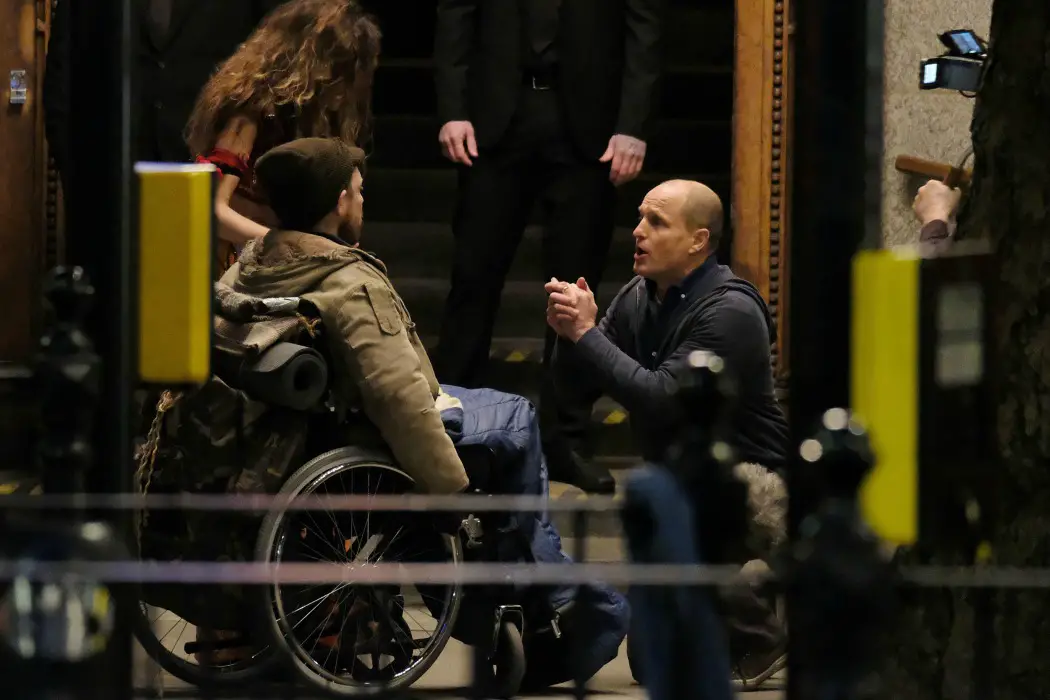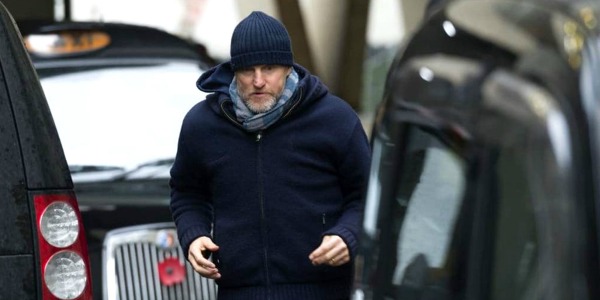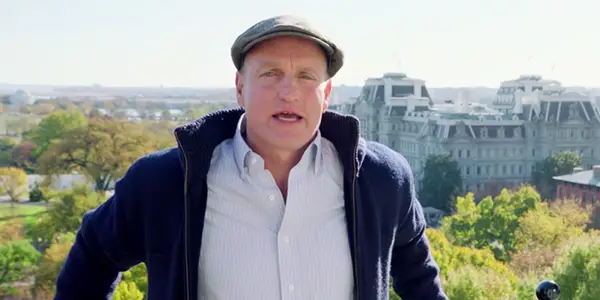LOST IN LONDON: Woody Harrelson’s Quietly Epic One-Take Wonder

Alistair is a 25 year old writer based in Cambridge.…
As far as directorial debuts go, you will be hard pressed to find any as audacious as Woody Harrelson’s Lost in London. Many actors make their first bow behind the camera a deliberately understated affair, focusing on the strength of their actors’ performances to carry the film. Harrelson has decided to take an embarrassing autobiographical tale, transform it into a meta analysis on the transient nature of celebrity – and then film the whole thing in one take.
More than just a gimmick
After Lost in London became the world’s first ever “live film”, beamed into cinemas worldwide as it was being filmed back in January 2017, it would be easy to be skeptical that the film was nothing more than a publicity generating gimmick. Now receiving a limited release a few months later, the film can successfully be viewed on its own terms, almost entirely divorced of gimmickry allegations – especially as it neatly slots in to the lineage of masterful one-take cinema, in particular the ambitious German heist film Victoria from 2015.
The probing, borderline-Dogme 95 handheld cinematography may prove off-putting to some viewers. But this stripped down style is the perfect compliment to a subtle satirisation of reckless celebrity privilege, that manages to get under the skin of our privileged protagonist (Harrelson playing himself), while also making him empathetic because of the universality of his flaws.

The film depicts a wild night Harrelson had in London back in 2002, although pop culture references here suggest it has an updated period setting. After news publicly breaks out that he had a one night stand with a gaggle of women, Woody’s wife takes his children back to their London hotel, leaving him to spend an evening alone, hoping to have a “quiet drink”, then head back to discuss the issue.
Things don’t go as planned. A fancy dress party with Iranian royalty leads him to his best friend Owen (played, of course, by Owen Wilson), whose methods of helping Woody deal with his emotional distress largely revolve around kicking him when he’s down. Soon, with his friendship and marriage in disarray, he finds himself getting into a fight with a taxi driver and sent for an evening in prison. Most impressively, this all unfolds in real time – meaning that in a space of an hour, we witness a man’s life spiral downhill in a manner devoid of the Hollywood glamour splashed over newspaper headlines.
A Scathing, yet oddly heartfelt, view of celebrity culture
With its critique of celebrity culture, in which Harrelson transforms a self-inflicted wound from his past into artistic catharsis, the film does frequently find it hard to shake off the comparison with Alejandro González Iñárritu’s Birdman. This isn’t just due to the content of the narrative, but the style. After all, we are watching this downfall unfold over the course of one solitary take, with intermittent jazz music bursting into life in the background and occasional camera pans towards surrealistic choreographed dancing, which is reminiscent of Iñárritu’s focus on the jazz drummer in his Academy Award-winning film.
Lost in London isn’t on the same artistic level as that aforementioned work – but as a comedy, it is a damn sight funnier and certainly more accessible when delivering similar jokes at the expense of celebrity culture. The handheld camera isn’t as tightly controlled, but it helps the film feel less arch when discussing the subject. For a film that was recorded live, that Harrelson himself has stated he did “very little directing” while making, there are a plethora of scenes that pack a punch.
The nightclub sequence with Woody and Owen, which slowly turns into an argument criticising each other’s filmographies (“In Marley and Me, you were acted off screen by that dog!”) manages to be both funny and oddly enough, brimming with palatable tension due to the score in the background. Very little post production work has been performed on the film prior to its non-live release, making sequences like this all the more impressive.

That sequences as flippant as the one I’ve outlined above manage to make an emotional impact is testament to Harrelson’s screenwriting. The most important thing when writing the screenplay was for him to find a perfect structure – and in achieving that above everything else, he’s managed to weave jokes in wherever they would most likely compliment the plot. What would be a fairly uneventful sequence in a police escort vehicle, for example, is drained of real time boredom by the simple, ingenious idea of introducing a brilliantly executed, extended throwaway gag, involving giving Bono a phone call.
Sequences like this make the film feel superior to Victoria, its obvious influence, which spent the best part of its first hour and a half documenting real time walking and cycling, with very little narrative interest to sustain the film’s momentum. Woody uses the issues surrounding real time filming to his advantage, and the result is a film that will always surprise you with laughs where you least expect them.
Because of this tightly controlled narrative structure, the innovative filming style never becomes distracting – even if the handheld cinematography often seems to be trying to give Paul Greengrass a run for his money in the shakey-cam arena. In fact, for many viewers, it could be easy to imagine them overlooking the filming technique altogether; the story itself manages to perfect the tricky tightrope walk of comedic cynicism and heartfelt autobiography in a way that I would have previously found unimaginable.
Conclusion
Lost in London may have been designed as a live event, designed to bridge the artistic differences between theatre and cinematic performances, yet it stands up on its own two feet divorced of that novelty. A strong contender for funniest film of the year, yet so much more than just a comedy, Lost in London is the rare film to live up to its lofty ambitions.
Which movies based around a single gimmick succeed – and which fail miserably?
Lost in London is released in London on May 1st, expanding across the UK on May 5th. International release dates will be decided upon its success in Britain- so UK audiences, get out and see it!
Does content like this matter to you?
Become a Member and support film journalism. Unlock access to all of Film Inquiry`s great articles. Join a community of like-minded readers who are passionate about cinema - get access to our private members Network, give back to independent filmmakers, and more.
Alistair is a 25 year old writer based in Cambridge. He has been writing about film since the start of 2014, and in addition to Film Inquiry, regularly contributes to Gay Essential and The Digital Fix, with additional bylines in Film Stories, the BFI and Vague Visages. Because of his work for Film Inquiry, he is a recognised member of GALECA, the Gay & Lesbian Entertainment Critics' Association.













